Two years ago, Lance was more than 13,000 kilometres away from Moshono, at school, in Medina, Minnesota, studying a subject called ‘Life Class’, when his teacher began talking about Tanzania and a school in Arusha.
It was at this point that Lance’s teacher showed the class a ‘60 Minutes’ documentary featuring an interview with The School of St Jude Founder, Gemma Sisia.
The documentary made an immediate impression on Lance.
He wanted to help.
“If you’re a kid and you can help another kid,” says Lance. “Then why not?”
That night, Lance went home and showed his parents the St Jude’s website, wanting them to be as enthused as he was by what he’d seen.
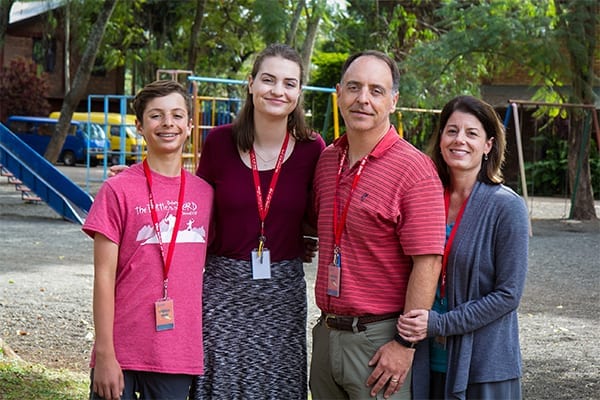
Lance’s parents were impressed by St Jude’s, but they figured this was a passing interest, like with other things Lance had learnt about at school.
“From our perspective,” says Lance’s dad, David. “He comes home from school with something exciting all the time.”
But weeks turned into months, and Lance did not let up.
Months later, for Christmas, Lance decided that instead of receiving presents, he wanted to try and sponsor a student's education. On his birthday, he doubled down, insisting that all the money he received be put towards helping St Jude’s.
“Lance’s mantra is ‘kids can do things’,” says David.
Encouraged by his parents, Lance pooled together all his money and began a shared sponsorship of an academic scholarship for a Standard 3 student, Twayiba.
He has now been supporting Twayiba for almost two years, with the two exchanging letters and photos several times a year.
It’s not just Lance who eagerly awaits to hear from Twayiba, but his parents and sister too.
“Because it’s Lance’s money that pays the sponsorship cost, it’s in his name and the letters go to him, so I’m always having to asking him – hey, let me see them too!” says Lance’s mother, Nicole.
As the exchange of letters continued, the two children, from opposite sides of the planet, began to establish a connection and Lance set about lobbying his parents to visit St Jude’s and Twayiba in person.
In July, they did just that.
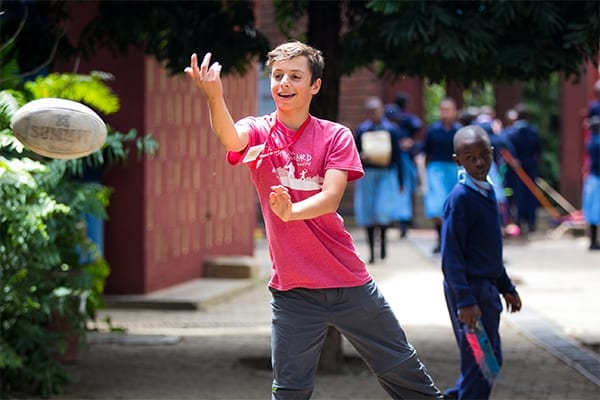
Upon arriving, Lance’s family were surprised by the enormity of St Jude’s.
“You think it’s going to be a little school,” says David. “But we came here and we were floored – it’s got multiple campuses and it’s grown so much.”
The family joined a reading lesson with a class of primary students in the library. Lance was impressed with the reading skills of the students.
“There were some pretty big words, like ‘fascinating’”, says Lance. “And they knew them! To think that only a couple of years ago they didn’t speak or read any English, it’s pretty amazing.”
Lance’s favourite thing about his visit?
“Visiting Twayiba’s home and meeting her family,” Lance easily recalls, “the culture exchange was great, we were all asking questions. How old we were, what our families were like. They were a bit surprised to find out it was me sponsoring Twayiba though, I think they thought it was my dad!”
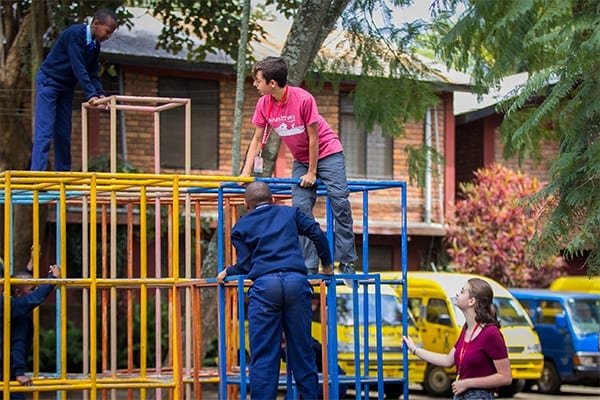
After visiting St Jude’s and seeing it in action for themselves, Lance and his family are now keener than ever to spread the word about St Jude’s.
'Welcome to our project, says Stephen, gesturing with a smile towards a table showcasing his science project: a computer and a model of a house. 'It's known as 'Alice', the home optimisation system.
Stephen is standing next to his co-creator, friend and fellow Form 4 student, John. The pair, who have worked on projects together since primary school, recently won the Perpetual Trophy for innovation, awarded by Young Scientists Tanzania, for the project they developed for this years' St Jude's Science Fair.
'We researched the problems facing Tanzania, says Stephen, 17. 'So we thought of security problems - people breaking into homes.
The annual Science Fair is a unique opportunity for students to innovate, experiment and get hands on experience with developing an invention from scratch.
This year was the ninth Science Fair for St Jude's, where students present science-based projects that can impact the community. The Fair is attended by over 1,000 students, as well as staff, visitors, and students from nearby government schools.
'We are always doing projects to help our society and community, says John, 18, who mainly worked on the hardware for Alice. 'We really want to improve the security systems available in our country.
Alice is composed of three modules: security, home automation, and personal assistance.
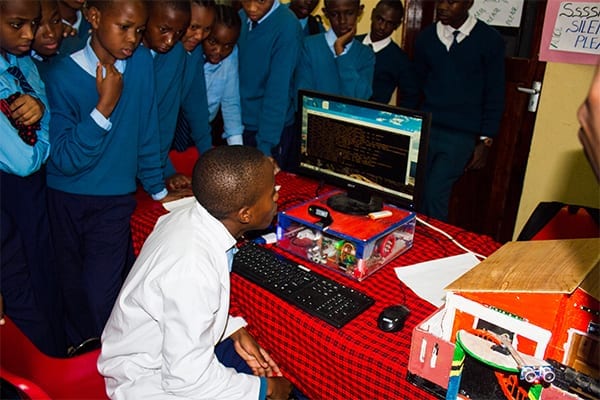
'Let's start with security, says Stephen, sitting down next to the house model, and pointing towards a mini-camera that is located above the house
gate.
The mini-camera begins scanning the area in front of the gate, using light and motion sensors.
'When anybody comes near your house, the camera picks it up and triggers an alarm inside the house, says Stephen, who worked on the programming for the project.
The gate itself has a knocking system, which allows the owner of the house to encode a specific knock sequence.
'If somebody knocks the correct pattern, says Stephen. 'The gate will open automatically.
The next feature of Alice is the home automation system, which consists of a solar panel tracker that sits on the roof, tracking the sun in order to charge the system.
'This can be used not just in houses, says John, 'but also in public buildings - in hotels, hospitals or supermarkets.
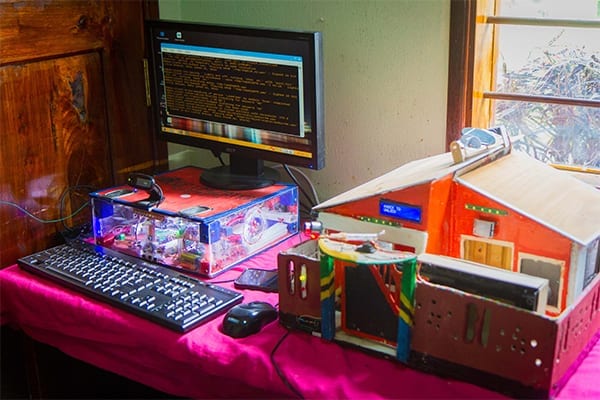
The final part of Alice is the personal assistance component.
'This will help you control everything in the house using voice command, says John, prodding Stephen to show an example.
Leaning towards the computer, Stephens says - 'Alice, play music.
The computer responds instantly.
'Please specify your type of music, replies a cool female, robotic voice.
'Alice, play bongo flava music, says Stephen, selecting a popular genre of Tanzanian hip hop.
After a slight pause, the sound of a raft of instruments with Swahili vocals fills the room.
Stephen and John first came up with the concept of Alice last November and began putting it together with the goal of presenting it at the St Jude's Science Fair in March of this year.
The two teenagers would find time to work on Alice during the week at Mr Dennis' Programming Club and even on weekends.
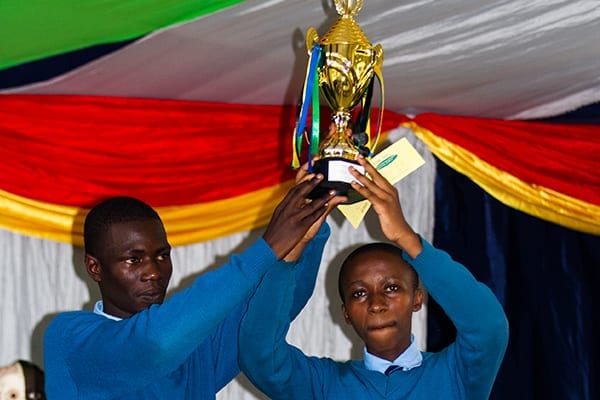
'Being at St Jude's you get exposed to different people and different experiences, says John. 'You get to share ideas. St Jude's provided us with the 'Raspberry Pi board', (a small, single board computer developed in the United Kingdom that converts spoken words to text via a 'speech to text engine' known as TTS), when we were developing our project.
Because of the resources and support provided by St Jude's, the two students, in addition to winning their award, were also able to present Alice to the Tanzanian Commission for Science and Technology (COSTECH) and have plans to develop their prototype further.
Make a donation to support St Jude's bright young scientists to become the
leaders of innovation in Tanzania.
On a sunny Thursday morning, at a government secondary school only ten minutes from St Jude’s, just over 50 students are crammed into a classroom. Cables hang from the tin ceiling, the paint on the walls is peeling and at the back of the classroom runs a long wooden bench, where students who aren’t lucky enough to have a desk are crammed shoulder-to-shoulder.
Zulfa, a 2019 St Jude’s graduate who is teaching commerce and business as part of her Community Service Year, walks into the classroom followed by 15 visitors.
The guests are 12 students, and three teachers from Methodist Ladies’ College (MLC), an all-girls school in Melbourne, Australia.
As the girls roam the classroom, they struggle to communicate as the local students speak little English.
Not the kind to give up, the MLC girls decide to sing a song they’ve learnt whilst being here that is popular amongst Tanzanian youth.
“Esther!” sing the girls, from the front of the classroom. “Hello sister!”
The class catch on, recognising the tune.
“I say come here,” sing the Tanzanian and Australian students together. “Look at the motor car!”
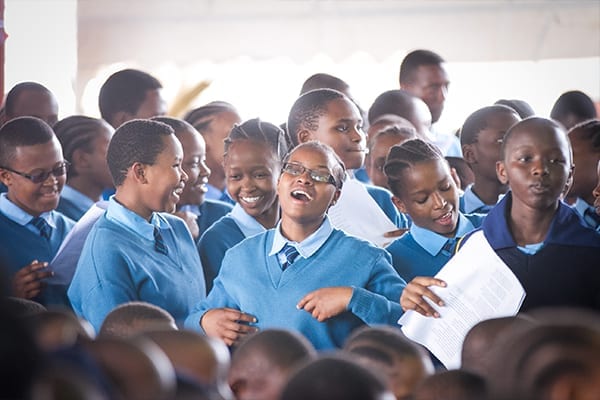
Some of the students begin standing up around the classroom, joining in with the MLC girls, dancing and pretending to drive a car – “shake your body, body, body!”
As the song finishes, Zulfa leads the visitors out of the classroom and into the yard. She begins talking about her experience teaching at a government school, and how this compares to her time at St Jude's.
“There are three main differences between St Jude’s and this school,” Zulfa tells her guests.
The first difference is the students’ lack of English skills, the second lies in outdated learning techniques and the final is a lack of resources.
“When it comes to exams, students will be paired off,” says Zulfa. “One will be given access to a desk and chair, the other will have to go outside, sit on the ground and write using their thigh for support.”
Teachers have to buy their own textbooks, supplying notes to all the students. The library is located in a shed; the shelves are half empty. The school has 1,453 students.
As the girls stand in the hot midday sun, a boy sprints across the yard to a tyre rim, hanging from a tree. He pulls out a stick and begins whacking the rusty relic to begin recess – clang, clang, clang!
Students begin spilling out of their classrooms, rushing towards the Australians.
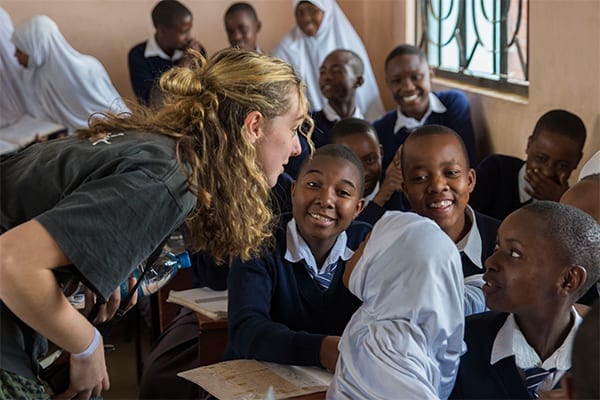
One of the MLC students, Allie, begins talking with a girl about what she wants to do in the future.
“I like it when I hear girls say they want to be a doctor or a lawyer,” says Allie. “It’s comforting, and makes me feel proud.”
In Tanzania, the majority of girls will leave school before their twelfth birthday.
“By giving girls an education,” says Zulfa. “You can get rid of early marriage, young pregnancy, and child labour.”
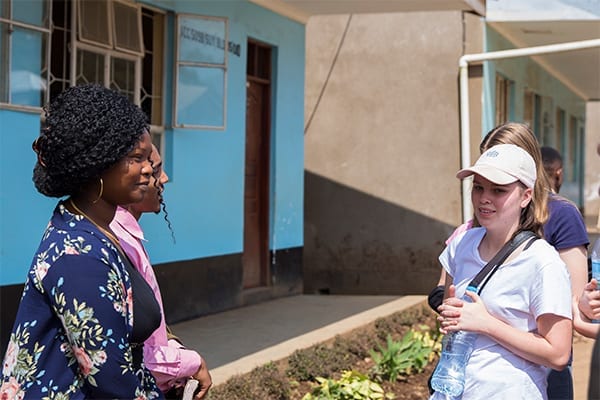
For this reason, Zulfa is excited that St Jude’s will be opening a new all-girls campus in Moshono for hundreds of secondary students.
“It’s important that girls have a space of their own,” says Zulfa. “To push each other, to become the doctors and engineers of the future.”
Emily, another of the MLC group, agrees with Zulfa.
“At MLC, we empower girls,” says Emily. “St Jude’s having an all-girls campus will do the same thing.”
Experience your own immersion into Tanzanian life and culture and see the impact St Jude’s is having on the community, organise a visit today.
Standing outside what will soon be the new girls' secondary school at St Jude’s, is a young woman and former graduate student named Irene. She is wearing a white t-shirt that says, ‘TAKE ME BACK TO SCHOOL’ in bold writing.
As part of Irene’s university studies, she was asked to think of an initiative that would give back to her community. Her idea: a program called ‘Take Me Back to School’.
Earlier this year, Irene saw a group of children hanging out in her neighbourhood during school hours.
“There were a lot of kids roaming around,” says Irene. “So I asked them - why don’t you go to school?”
They told her that they couldn’t afford pens, books or uniforms. Whilst secondary education is now officially free in Tanzania, costs like these, in addition to exam fees and having to supply or pay for their own food means that families often struggle to keep their children in school. Less than 30% of children in Tanzania are attending secondary school.
This is a situation that Irene is determined to change.
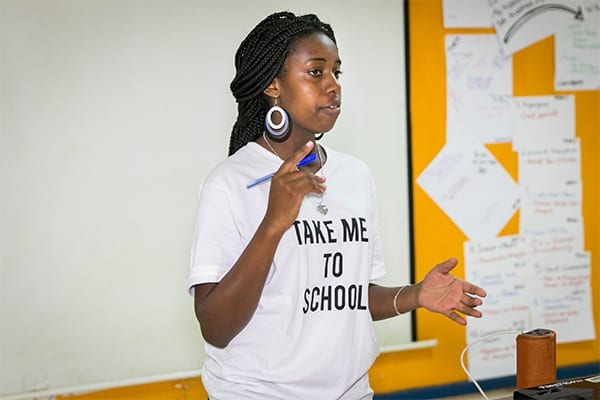
“This project is my first big shot,” says Irene, who was raised locally in Moshono. “It’s basically a program touching two parts of society at the same time – school students and young adults.”
The first stage of her project is delivering a four-day workshop, with invited guest speakers and group activities. The project is designed to help young adults develop their own business ideas, offering support and equipping them to be successful young entrepreneurs.
“For the young adults, [Take Me Back to School] is a workshop, that deals with leadership, communication, team building, team work, and entrepreneurship,” says Irene.
Guest speaker and local businessman, Edward Lazarro, shared his experience of starting his own business and focused on the process behind generating ideas.On the final day, the 25 attendees presented their own business ideas to a panel of judges, using tools they had learnt in the workshops.
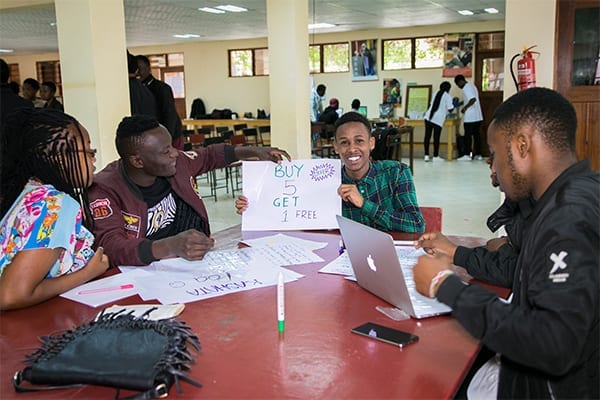
Their brief was that all ideas needed to be creative and sustainable, fit the needs of the community and be engaging. One pitch was ‘Save the Planet’, an idea to form partnerships with organisations to combat climate change by planting species of trees that take less time to grow and are low cost.
Vivian, Beyond St Jude’s Coordinator, was invited to be a guest judge on the panel and was impressed by Irene’s workshop.
“She could have done anything, gone anywhere with this project,” says Vivian. “But for her to think to create something for the St Jude’s graduates, and other young people in the local community, was so amazing.”
The next stage of Irene’s project is to help the children she saw on her street, supplying them with uniforms and textbooks and helping them get back into school.
But first, Irene will return to the United States International University in Kenya, where she is studying a Bachelor’s degree in International Business Administration.
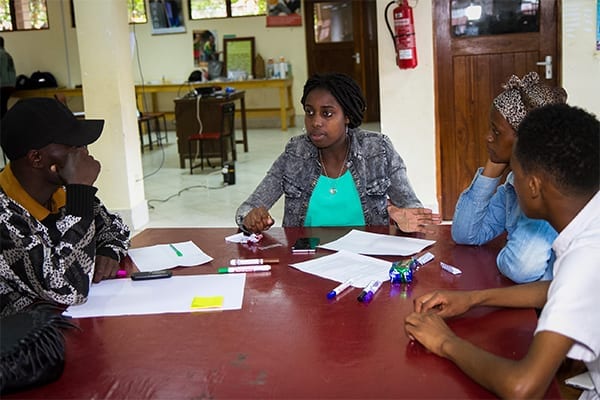
Long term, she has an even bigger project in the pipeline – to help young, single mothers.
In the meantime, Irene looks around the bustling room where her workshop is humming with activity, not just from the attendees, but also from a group of workmen that are busily moving desks, shelves, and books.
As of January next year, this room will become the library in the new, all-girls secondary school and 400 girls will step into her place, beginning their journey to become the Irene’s of tomorrow.
You can support our students to become the Irene’s of tomorrow by sponsoring a student’s academic scholarship today.